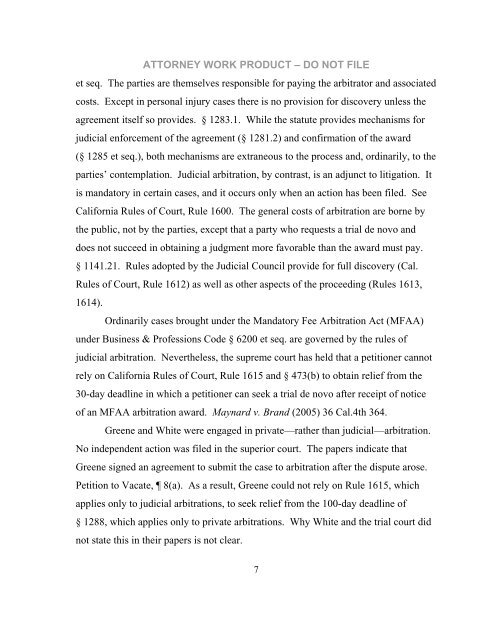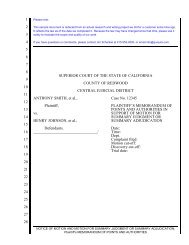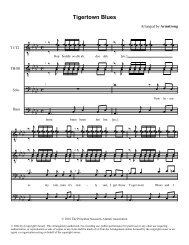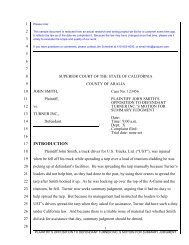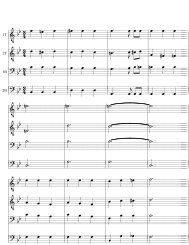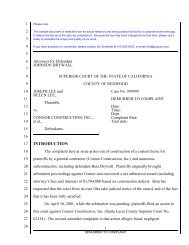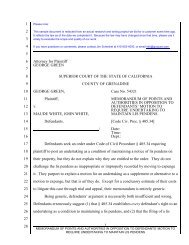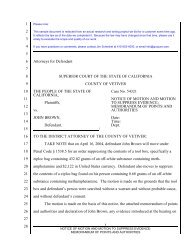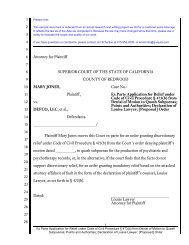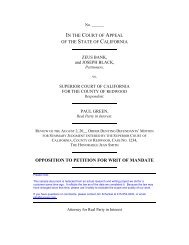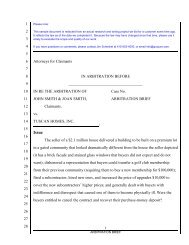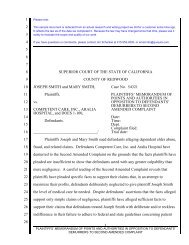FACTS AND PROCEDURAL HISTORY - Quo Jure Corporation
FACTS AND PROCEDURAL HISTORY - Quo Jure Corporation
FACTS AND PROCEDURAL HISTORY - Quo Jure Corporation
Create successful ePaper yourself
Turn your PDF publications into a flip-book with our unique Google optimized e-Paper software.
ATTORNEY WORK PRODUCT – DO NOT FILE<br />
et seq. The parties are themselves responsible for paying the arbitrator and associated<br />
costs. Except in personal injury cases there is no provision for discovery unless the<br />
agreement itself so provides. § 1283.1. While the statute provides mechanisms for<br />
judicial enforcement of the agreement (§ 1281.2) and confirmation of the award<br />
(§ 1285 et seq.), both mechanisms are extraneous to the process and, ordinarily, to the<br />
parties’ contemplation. Judicial arbitration, by contrast, is an adjunct to litigation. It<br />
is mandatory in certain cases, and it occurs only when an action has been filed. See<br />
California Rules of Court, Rule 1600. The general costs of arbitration are borne by<br />
the public, not by the parties, except that a party who requests a trial de novo and<br />
does not succeed in obtaining a judgment more favorable than the award must pay.<br />
§ 1141.21. Rules adopted by the Judicial Council provide for full discovery (Cal.<br />
Rules of Court, Rule 1612) as well as other aspects of the proceeding (Rules 1613,<br />
1614).<br />
Ordinarily cases brought under the Mandatory Fee Arbitration Act (MFAA)<br />
under Business & Professions Code § 6200 et seq. are governed by the rules of<br />
judicial arbitration. Nevertheless, the supreme court has held that a petitioner cannot<br />
rely on California Rules of Court, Rule 1615 and § 473(b) to obtain relief from the<br />
30-day deadline in which a petitioner can seek a trial de novo after receipt of notice<br />
of an MFAA arbitration award. Maynard v. Brand (2005) 36 Cal.4th 364.<br />
Greene and White were engaged in private—rather than judicial—arbitration.<br />
No independent action was filed in the superior court. The papers indicate that<br />
Greene signed an agreement to submit the case to arbitration after the dispute arose.<br />
Petition to Vacate, 8(a). As a result, Greene could not rely on Rule 1615, which<br />
applies only to judicial arbitrations, to seek relief from the 100-day deadline of<br />
§ 1288, which applies only to private arbitrations. Why White and the trial court did<br />
not state this in their papers is not clear.<br />
7


